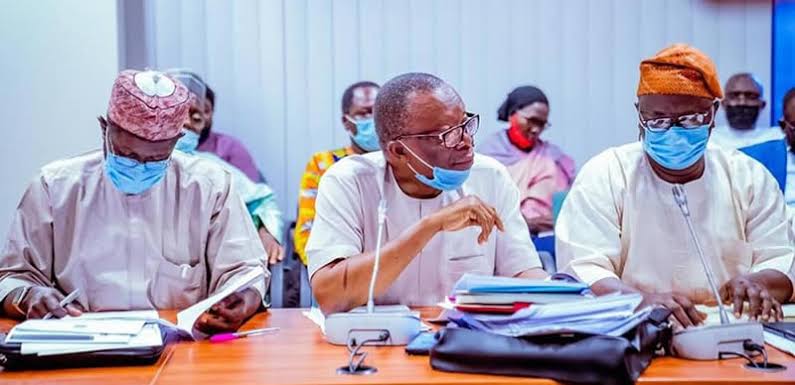Education
UNIVERSITY LECTURERS, ASUU LAMENTS 15 YEARS STAGNATED SALARIES, DEMANDS TINUBU’S URGENT INTERVENTION
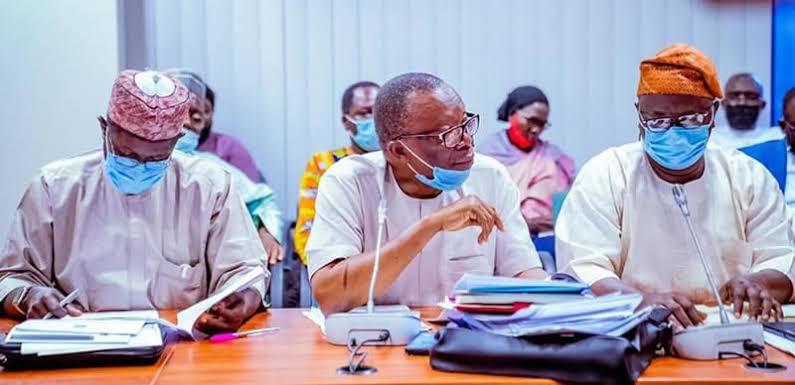
Education
1ST NIGERIAN TERTIARY INSTITUTIONS CONFERENCE ON UN SUSTAINABLE DEVELOPMENT GOALS (SDGS) ESSAY COMPETITION
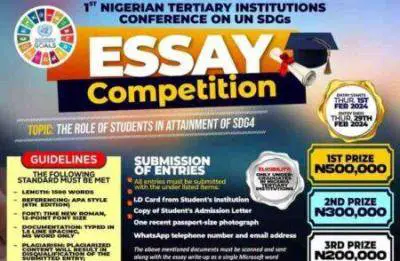
Competition Overview:
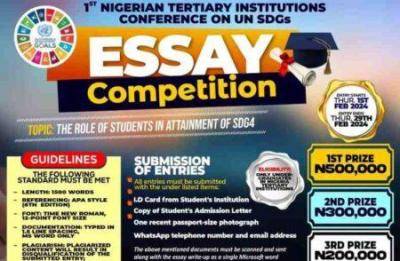
The SDG Youth Essay Competition offers a grand prize of N1 million for the top three winners, along with free sponsorship to attend the 1st Nigeria Tertiary Institution Conference on Sustainable Development Goals (SDGs) in April 2024 in Abuja.
Competition Requirements:
1. Eligibility:
– Open exclusively to undergraduates in Nigerian tertiary institutions.
2. Entry Guidelines:
– Topic:The Role of Students in Attainment of SDG4
– length: Essays should be 1500 words.
– Entry Period: Thursday, February 1, 2024 – Thursday, February 29, 2024
– Referencing: APA Style (6th Edition).
– Font: Times New Roman, 12-point font size.
– Documentation: Typed in 1.5 line spacing, MS Word format only.
– Plagiarism: Only original content is accepted; plagiarized entries will be disqualified.
Benefits:
– Prizes:
– 1st Prize: N500,000
– 2nd Prize: N300,000
– 3rd Prize: N200,000
– Winners will also receive free sponsorship to attend the 1st Nigeria Tertiary Institution Conference on Sustainable Development Goals (SDGs) in April 2024 in Abuja.
Required Documents:
– Student’s Institution ID Card
– Copy of Student’s Admission Letter
– One recent passport-size photograph
– WhatsApp telephone number and email address
Application Procedure:
– All entries and submissions (essay and required documents) should be scanned and sent to nigeriaessay@sdgyouth.org before the deadline.
For Further Inquiries:
– Call: 08068931151, 08133846739, 07067772964
– Email: nigeriaessay@sdgyouth.org
Deadline: February 29th, 2024
Don’t miss this opportunity to contribute to achieving SDG4 and win exciting prizes. Submit your entry and required documents before the deadline. For any inquiries, feel free to contact them via phone or email.
Education
PENTAGON PARTNERS NATIONAL ESSAY COMPETITION FOR UNDERGRADUATE LAW STUDENTS
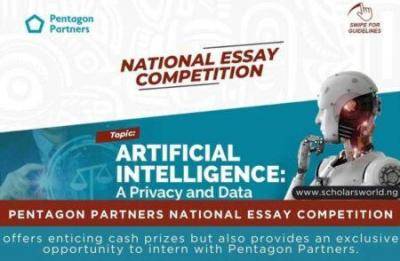
Competition Overview:
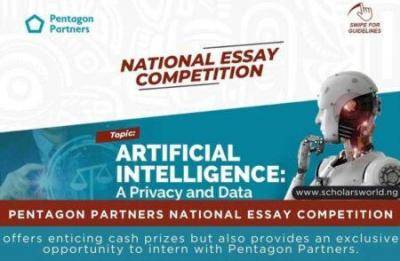
The National Essay Competition invites undergraduate law students to showcase their expertise and contribute to the discourse on AI, privacy, and data protection. In addition to cash prizes, participants have the chance to intern with Pentagon Partners, gaining valuable hands-on experience.
Competition Requirements:
1. Eligibility:
– The competition is open to 400-level and 500-level undergraduate law students in Nigerian universities.
2. Essay Requirements:
– Length: Essays should not exceed 1500 words.
– Format: Double spaced, 12pt Times New Roman font.
– References: OSCOLA format for citations with 10pt font size for footnotes and endnotes.
– Submission Format: Essays must be submitted in PDF format.
– Entrant Details: Include full names, school, level, phone number, and email address in both the body of the email and on the last page of the essay.
– Single Entry: Each entrant is allowed only one submission.
– Originality: Plagiarism will result in automatic disqualification.
Competition Benefits and Timeline:
1. Prizes:
– Winner: N200,000
– 1st Runner Up: N150,000
– 2nd Runner Up: N100,000
2. Internship Opportunity:
– In addition to cash prizes, winners have the exclusive opportunity to intern with Pentagon Partners, enhancing their career prospects.
Application Procedure:
– Interested participants should submit their essays to essay@pentagonpartnerslp.com during the submission period.
– The subject of the email should be the Essay topic
For additional information and updates, visit www.pentagonpartnerslp.com.
Deadline: March 22nd, 2024
Don’t miss this chance to showcase your legal expertise, contribute to important discussions on AI and law, and vie for enticing cash prizes. Pentagon Partners looks forward to receiving your submissions.
Education
SYSTEMSPECS CHILDREN’S DAY ESSAY COMPETITION (CDEC), 2024

Purpose:
Inaugurated in 2020, the CDEC is part of SystemSpecs’ Corporate Social Responsibility (CSR) commitment to promoting capacity development in the Nigerian ICT industry. By encouraging young Nigerians to tackle everyday issues, the competition contributes to intellectual growth and societal progress.

Topic:
The theme for the 2024 competition is “Protecting the Nigerian Child from the Dangers of Online Technology.” Participants are tasked with exploring strategies to safeguard children in an increasingly digital world.
Eligibility:
– Open to primary and secondary school students in Nigeria aged 9 to 16.
– Junior category (ages 9 to 12) essays must not exceed 1,000 words.
– Senior category (ages 13 to 16) essays must not exceed 1,500 words.
Prizes:
– Winners will receive generous rewards, including a high-capacity laptop, premium headphones, a portable laptop stand, a smart wristwatch, and one year of internet data, among other items.
– Consolation prizes will be awarded to other participants.
Application Process:
– Interested candidates should access the application page
– Essays must be written in English and reflect original thought.
– Each participant is limited to one entry.
– Entries must be endorsed by an accredited school official, parent, or legal guardian.
– Deadline for submissions is April 12, 2024.
Submission Guidelines:
– All submissions must be in PDF format and include the student’s name, home and school addresses, email address, and contact phone number.
– Double entries will result in automatic disqualification.
– Submissions must be received by March 15, 2024, at 5:00 p.m.
Notification of Winners:
– Successful students and schools will be contacted in the second quarter of the year.
– Updates on winners will be announced on @nercng social media platforms.
The SystemSpecs Children’s Day Essay Competition offers a unique opportunity for Nigerian students to demonstrate their creativity and problem-solving skills. By addressing the theme of online child protection, participants contribute to building a safer and more secure digital environment for all. We encourage eligible students to seize this opportunity and showcase their talent and ingenuity.
-

 News2 years ago
News2 years agoFull Text of President Bola Tinubu’s Inauguration Speech on May 29, 2023
-

 Education7 months ago
Education7 months agoSYSTEMSPECS CHILDREN’S DAY ESSAY COMPETITION (CDEC), 2024
-

 CELEBRITY NEWS2 years ago
CELEBRITY NEWS2 years ago“E no balance”-Netizens react as Bobrisky shows off new shape days after surgery
-

 entertainment10 months ago
entertainment10 months agoAuthorities Arrest Six in Connection with Murder of South African Rapper AKA [VIDEO]
-

 Education6 months ago
Education6 months agoPENTAGON PARTNERS NATIONAL ESSAY COMPETITION FOR UNDERGRADUATE LAW STUDENTS
-
Headlines2 years ago
FULL TEXT: Tinubu Addresses 78th UN General Assembly
-
Headlines2 years ago
Full Text Of President Bola Tinubu’s Address To Nigerians On Socio-economic Challenges
-

 Headlines10 months ago
Headlines10 months agoTinubu Takes Full Responsibility for Current Economic Hardship

